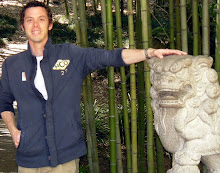 War films are another one of those Hollywood genres which tend to follow very well - worn patterns when it comes to plot, action and characters. We, as American, are used to seeing the American experiences on the battlefield and are usually only shown the cruelty of our enemy. But Letters From Iwo Jima challenges those conventions and presents the audience with the story from the other side of those battle lines.
War films are another one of those Hollywood genres which tend to follow very well - worn patterns when it comes to plot, action and characters. We, as American, are used to seeing the American experiences on the battlefield and are usually only shown the cruelty of our enemy. But Letters From Iwo Jima challenges those conventions and presents the audience with the story from the other side of those battle lines.As the Allied forces prepare to storm the beaches of Iwo Jima, Japanese General Tadamichi Kuribayashi and his troops know they are facing staggering odds. With a limited amount of time and resources, all of the Japanese troops realize that the impending fight just might be their last.
How is it that Mr. Dirty Harry, Clint Eastwood, was able to create such a stirring and devastatingly emotional war film about the Japanese experience during the famous World War II fight? He humanized the Japenese solider and gave the normally faceless enemy, (at least in most American made war films), soldiers names and stories, Western audiences are only used to experiencing war through the eyes of an American soldier but by doing this, he opened the audiences' eyes to the insanity that is war and the trials that all sides face. Eastwood also broke standard war film tradition by showing the loosing side of war and all of the chaos, loss and mourning they had to work through. This served to, again, humanize a normally cliched set of characters. To see the depth to which the Japanese went to in order to stave off the enemy, including a terrifyingly realistic scene in which some soldiers committed suicide via grenade to avoid capture, was remarkable and fell into sharp contrast with the way Westerners view warfare. One came away feeling a great respect for the Japanese soldiers’ plight and, hopefully, a deeper desire to make sure destructive conflicts such as World War II never happen again. As the companion piece to Flags of Our Fathers, Letters from Iwo Jima carried a heavy burden of trying to match or surpass it in emotional resonance and overall magnificence, a task which it achieved in stunning fashion.
Grade: A

No comments:
Post a Comment